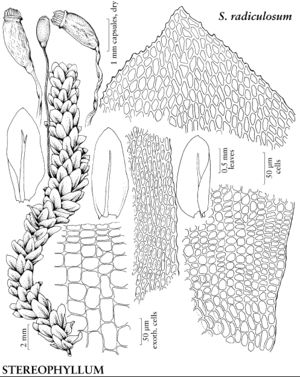Stereophyllum
J. Proc. Linn. Soc., Bot., suppl.: 117. 1859.
| Taxon | Illustrator ⠉ | |
|---|---|---|
 | Stereophyllum radiculosum | Patricia M. Eckel |
Plants in thin to dense mats, pale to yellow-green, sometimes brownish, dull. Stems with central strand absent or poorly developed; axillary hair apical cells 4. Stem and branch leaves similar, stiff, close, imbricate and somewhat contorted when dry, erect-spreading when moist, oblong-ovate to nearly lingulate, symmetric, not plicate; margins plane, entire or serrulate near apex; apex abruptly acute to obtuse, sometimes apiculate; costa 2/3–3/4 leaf length; laminal cell-walls thick; medial and distal cells quadrate to rhomboidal, 1-papillose over lumina on both surfaces or sometimes smooth. Perigonia with leaves costate. Perichaetia at base of stems, leaves oblong-lanceolate, costate, proximal laminal cells rectangular, distal cells linear-flexuose. Seta orange to reddish, straight to somewhat flexuose. Capsule cernuous or rarely erect, orange to brown, ellipsoid to ovoid; exothecial cell-walls thin; annulus persistent, 2-seriate or 3-seriate, cell-walls firm; operculum short-rostrate, sometimes oblique; exostome teeth shouldered, internal surface projecting; endostome finely papillose, basal membrane high, segments almost as long as exostome teeth, cilia 1–3, shorter than segments. Spores spheric to ovoid, 12–24 µm.
Distribution
sc, se United States, Mexico, West Indies, Central America, South America, Asia, Africa, Pacific Islands (Philippines), Australia
Discussion
Species 2 (1 in the flora).
The second species in the genus, Stereophyllum linisii Enroth & B. C. Tan, was described in 2007 from the Philippines.
Selected References
None.